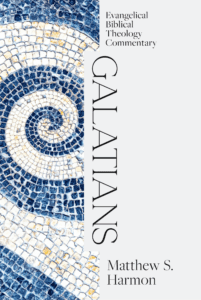
Paul’s letter to the Galatians reveals how Christ changes everything. Matthew S. Harmon traces the argument of Paul’s most polemic letter. In Galatians, Paul defends his authority and attacks his opponents’ arguments—and in both cases, the decisive factor is the Gospel. History and Scripture must be interpreted in light of Christ’s arrival. The new creation has broken in, leaving nothing unaltered. In this interview with Harmon, we discuss the process of writing his commentary on Galatians.
Lexham Press: What is your favorite verse or section in Galatians and why?
Matthew Harmon: On a personal level I have always been drawn to Galatians 2:19-20. I love how powerfully it brings together the themes of union with Christ, the new life we have in him, and Christ dwelling in us, all rooted in Christ loving us and giving himself for us.
As a biblical scholar, I have long been fascinated with Paul’s “allegory” in 4:21-5:1. The way that he uses later Scripture (Isa 54:1) to read earlier Scripture (Gen 16-21)—all for the goal of helping us understand how Jesus is the fulfillment of the Abrahamic promises—has long intrigued and challenged me.
LP: For writing this commentary, what was your own process like? Did you begin with secondary literature, a close reading of the Greek text, or something else?
Harmon: In one sense the groundwork for the commentary was laid in my Ph.D. program at Wheaton. As I worked on Paul’s Use of Isaiah in Galatians, I spent extended time in the Greek text of Galatians. In my early years as a professor, I had repeated opportunities to teach through the Greek text at Grace Theological Seminary, as well as teaching Galatians in my local church. So when I was approached to write this commentary on Galatians, I was thrilled to build on this foundation.
When it came to actually writing the commentary, I began with the notes I had already accumulated and wrote a first draft. As much as possible, I tried to avoid secondary literature so that my engagement with the text was not significantly influenced by others. Once that draft was complete I began digging into the secondary literature to fill in gaps in my understanding.
LP: What were the most challenging and most enjoyable aspects of working on this commentary?
Harmon: Galatians is such a rich letter that it can be tempting to want to chase down every possible rabbit trail. There are so many fascinating aspects of Galatians that one can easily lose sight of the forest in the examination of the individual trees. But the richness of Galatians is what makes writing a commentary on this letter so enjoyable. I love how exegesis, hermeneutics, the use of the OT, biblical theology, and practical Christian life application all come together!
LP: What sets your commentary apart from others on the letter?
Harmon: I have benefited greatly from the work of other scholars on Galatians and have tried to incorporate the best of available scholarship on the letter. But in keeping with the emphasis of this commentary series, I have tried to highlight the biblical-theological themes and background that inform what Paul writes in Galatians. I have tried to pay particular attention to how OT citations, allusions, echoes, and thematic parallels undergird Paul’s argument and theology in the letter. I believe that Galatians itself invites us to do this. One of the goals of this commentary is to help readers understand how Paul read his Bible so we can do likewise.
LP: Each Evangelical Biblical Theology Commentary volume notes the unique theological themes of the book in question and how they weave throughout scripture. What are some of the most notable ones in Galatians?
Harmon: Some of the more obvious themes include righteousness/justification, the Law, and the Holy Spirit. But perhaps the most distinctive one I’ve included is the Servant of the Lord. Paul uses language from the Isaianic Servant Songs to describe both his own apostolic calling/commission and the work of Jesus on our behalf. I try to tease that out in the theological themes. I also discuss Paul’s extensive use of the OT, including a summary chart of every citation, allusion, echo, and thematic parallel mentioned in the commentary.
LP: What is something surprising about yourself, completely unrelated to commentaries?
Harmon: When I went to college I was planning on being a sports broadcaster. God obviously had very different plans! But God has been kind to give me opportunities to coach basketball at the high school level and even do color commentary for some basketball games here at Grace College.







